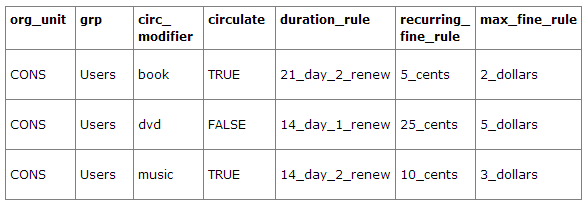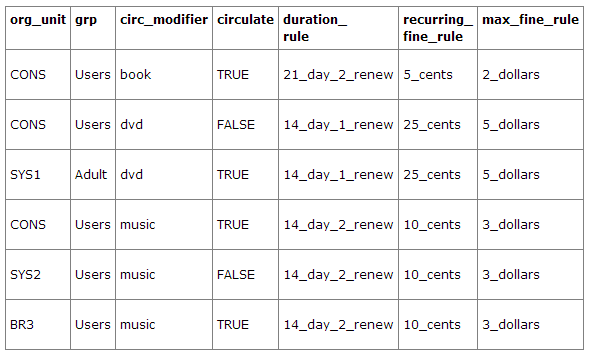Creating Circulation Policies
Once you have identified your data elements that will drive circulation policies
and have created your circulation rules, you are ready to begin creating your
circulation policies.
If you are managing a small number of rules, you can create and manage
circulation policies in the staff client via Administration → Local Administration →
Circulation Policies. However, if you are managing a large number of policies,
it is easier to create and locate rules directly in the database by updating
config.circ_matrix_matchpoint.
The config.circ_matrix_matchpoint table is central to the configuration of
circulation parameters. It collects the main set of data used to determine what
rules apply to any given circulation. It is useful for us to think of their
columns in terms of match columns, those that are used to match the
particulars of a given circulation transaction, and result columns, those that
return the various parameters that are applied to the matching transaction.
Best practices for creating policies
-
Start by replacing the default consortium-level circ policy with one that
contains a majority of your libraries' duration, recurring fine, and max fine
rules. This first rule will serve as a default for all materials and permission
groups.
-
If many libraries in your consortium have rules that differ from the default
for particular materials or people, set a consortium-wide policy for that circ
modifier or that permission group.
-
After setting these consortium defaults, if a library has a circulation rule
that differs from the default, you can then create a rule for that library. You
only need to change the parameters that are different from the default
parameters. The rule will inherit the values for the other parameters from that
default consortium rule.
-
Try to avoid unnecessary repetition.
-
Try to get as much agreement as possible among the libraries in your
consortium.
Example 1
In this example, the consortium has decided on a 21_day_2_renew loan rule for
general materials, i.e. books, etc. Most members do not charge overdue fines.
System 1 charges 25 cents per day to a maximum of $3.00, but otherwise uses the
default circulation duration.
Example 2
This example includes a basic set of fields and creates a situation where items
with a circ modifier of "book" or "music" can be checked out, but "dvd" items
will not circulate. The associated rules would apply during checkouts.
Example 3
This example builds on the earlier example and adds some more complicated
options.
It is still true that "book" and "music" items can be checked out, while "dvd"
is not circulated. However, now we have added new rules that state that "Adult"
patrons of "SYS1" can circulate "dvd" items.
Settings Relevant to Circulation
The following circulation settings, available via Administration
→ Local Administration → Library Settings Editor, can
also affect your circulation duration, renewals and fine policy.
-
Auto-Extend Grace Periods - When enabled, grace periods will auto-extend.
By default this will be only when they are a full day or more and end on a
closed date, though other options can alter this.
-
Auto-Extending Grace Periods extend for all closed dates - If enabled and
Grace Periods auto-extending is turned on, grace periods will extend past all
closed dates they intersect, within hard-coded limits.
-
Auto-Extending Grace Periods include trailing closed dates - If enabled and
Grace Periods auto-extending is turned on, grace periods will include closed
dates that directly follow the last day of the grace period.
-
Checkout auto renew age - When an item has been checked out for at least
this amount of time, an attempt to check out the item to the patron that it is
already checked out to will simply renew the circulation.
-
Cap Max Fine at Item Price - This prevents the system from charging more
than the item price in overdue fines.
-
Lost Item Billing: New Min/Max Price Settings - Patrons will be billed
at least the Min Price and at most the Max price, even if the item’s price
is outside that range. To set a fixed price for all lost items, set min and
max to the same amount.
-
Charge fines on overdue circulations when closed - Normally, fines are not
charged when a library is closed. When set to True, fines will be charged during
scheduled closings and normal weekly closed days.




